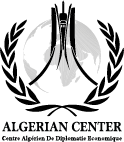L’importance stratégique du renforcement de la coopération économique entre l’Algérie et le Canada – Entretien avec S.E Christopher Wilkie – Ambassadeur du Canada en Algérie

Entretien publié le 29 Juin 2021
Centre Algérien de Diplomatie Économique : Merci Monsieur l’Ambassadeur d’avoir accepté mon invitation pour le Centre Algérien de Diplomatie Économique. C’est un Grand plaisir de s’entretenir avec vous aujourd’hui sur l’importance stratégique du renforcement de la coopération économique entre l’Algérie et le Canada.
Avant de commencer, je tiens à préciser que le Canada est un des rare pays au monde qui fait parti à la fois de la francophonie et du Commonwealth, pour cela, notre entretien se déroulera à la fois en Français et en Anglais.
Ambassadeur Wilkie : Bonjour Monsieur, je suis ravi d’être parmi vous aujourd’hui, c’est vraiment un plaisir de participer à cette séance avec le Centre Algérien de Diplomatie Economique. Je suis là pour répondre à vos questions avec le but effectivement de mettre nos relations plus profonde que jamais.
CADE : Ambassador Wilkie: You are graduated from Hons university in Political Studies. A Master in science in Economics from Queen’s University, at London School of Economics. And finally, you obtained PhD in International Relations at Oxford University.
You’ve joined the Department of Foreign Affairs and International Trade in 2004. At headquarters, you were an Executive Director of U.S. Transboundary Relations, where you led the Government of Canada’s representation to the International Joint Commission.
Most recently, you were appointed as Director General of the Trade Sectors Bureau. Overseas, you served as Canadian ambassador to Morocco (with concurrent accreditation to Mauritania) from 2009 to 2012.
Dr. Wilkie you’ve represented Canada in senior capacities on international investment and other issues, including at the world trade organization and United Nations Conference on Trade and Development, as chief negotiator for foreign investment promotion and protection agreement with China, new European Union member states and other countries.
You’ve also worked at the Privy Council Office and Industry Canada in Ottawa, for the Organisation for Economic Co-operation and Development in Paris, and for strategic consulting firms in Canada and Europe.
Ambassador Wilkie, You were appointed as Ambassador to Algeria in 2019.
Centre Algérien de Diplomatie Economique : Comment qualifieriez-vous les relations actuelles entre le Canada et l’Algérie ?
Ambassadeur Wilkie : Merci de cette introduction
Je suis très heureux d’être ici aujourd’hui pour cet entretien avec le Centre Algérien de Diplomatie Economique. Et pour répondre à votre question, je dirais que le Canada et l’Algérie ont toujours entretenu des relations amicales et sereines depuis l’indépendance de l’Algérie en 1962. Le Canada a continuellement été présent pour l’Algérie en vue de l’accompagner sur la voie du développement ; les enjeux économiques et commerciaux occupent une place très importante dans cette relation bilatérale, tout comme les questions de sécurité, notamment, régionale. Aujourd’hui, les relations entre nos deux pays sont cimentées par une importante communauté s’élevant à 125 000 Canadiennes et Canadiens d’origine algérienne. Cela représente un réel atout pour nos deux pays. La communauté algérienne au Canada dispose de capacités d’adaptation et d’intégration impressionnantes, de même que leur niveau de qualification qui leur permet d’apporter une importante contribution à la société canadienne.
CADE : Quels sont la qualité et le volume des échanges commerciaux entre le Canada et l’Algérie, ainsi que les principaux secteurs d’activité ciblés ?
Ambassadeur Wilkie : L’Algérie a toujours été l’un des partenaires commerciaux les plus importants du Canada sur le continent africain. En 2020, nos échanges commerciaux bilatéraux sont évalués à plus de 650 millions de dollars canadiens. Il est vrai que le niveau des échanges à caractère économique est moins important que les années précédentes, mais c’est plus diversifié. Cela peut s’expliquer par le fait que le Canada n’achète plus beaucoup de pétrole. Néanmoins, on a des échanges de biens et de services, ainsi que les investissements liés aux secteurs de l’aéronautique, de l’éducation, des TIC, des sciences de la vie, de l’agroalimentaire, qui est très important, et bien évidemment, de l’énergie.
Par ailleurs, l’Algérie demeure le marché le plus important en ce qui concerne les exportations canadiennes de blé dur. L’Algérie exige un niveau de qualité élevé dans ses importations de blé et le Canada est réputé être l’un des meilleurs fournisseurs de blé dur au monde. Les principales autres exportations canadiennes pour l’Algérie incluent la poudre de lait, les légumineuses, le soja, divers autres produits alimentaires, mais aussi le minerai de fer, les produits aérospatiaux et même du matériel informatique.
En ce qui concerne notre avenir commun, et en incluant la question des secteurs prioritaires pour l’Algérie, le secteur minier offre de belles perspectives pour le Canada. Je me réjouis d’ailleurs qu’une délégation algérienne ait participé à la convention annuelle de l’Association Canadienne des Prospecteurs et Entrepreneurs (PDAC en anglais), qui est le salon le plus important au monde dans le secteur minier, et qui s’est tenu virtuellement en mars dernier. J’ai été content que le ministre de l’Energie et des Mines, Mohamed Arkab, ait pu participer virtuellement au sommet international des ministres des Mines en marge de cet événement.
CADE : D’après nos investigations, il nous est apparu pertinent de dire que beaucoup d’investisseurs canadiens hésitent ou sont prudents quant au fait d’investir massivement en Algérie. Selon vous, qu’est ce qui fait obstacle ? Et comment l’Algérie pourrait-elle agir en vue d’améliorer son climat des affaires afin d’encourager les investissements directs étrangers notamment canadiens ?
Ambassadeur Wilkie : Jean Chrétien, qui fut le 20e premier ministre du Canada disait : « Il n’y a rien de plus nerveux qu’un million de dollars … », et c’est vrai, car il faut rappeler que pour les investisseurs, il existe des opportunités partout dans le monde. En effet, il y a des opportunités intéressantes ici, en Algérie, mais il en existe d’autres sur le continent Africain, en Amérique latine et bien évidemment sur des marchés plus traditionnels pour le Canada tels que les États-Unis représentant la première puissance économique mondiale.
En outre, l’Algérie a entrepris récemment quelque chose de très intéressant pour un investisseur étranger. J’ai déjà évoqué le secteur minier, j’aimerais également parler des énergies renouvelables. Je me suis rendu récemment dans la ville d’Oran pour le salon sur les énergies renouvelables afin d’affirmer la volonté du Canada d’accompagner l’Algérie dans ce domaine.
Par ailleurs, on bénéficie aujourd’hui d’une lecture plus claire de la loi dite 51/49. C’est un aspect qui revêt une grande importance car cela tend vers plus de transparence, ce qui est primordial pour les investisseurs canadiens en particulier et les investisseurs étrangers de manière générale.
Je crois sincèrement que les réformes économiques entreprises par l’Algérie tendent vers un climat des affaires plus apaisé pour les investisseurs canadiens. Je constate également dans un contexte plus global, que le développement de l’Algérie en Afrique, à travers la zone de libre-échange continentale, est en bonne voie. Ce qui est très intéressant pour le Canada, qui souhaite contribuer à ce projet africain en apportant son soutien à cette initiative.
Donc, on peut dire que la transparence, le climat des affaires et la stabilité socio-économique sont autant d’éléments vitaux pour les investisseurs étrangers. C’est en assurant ces trois éléments, que l’Algérie pourra être plus attractive et rendre son économie davantage compétitive.
CADE : Le Canada compte la plus importante diaspora algérienne après la France. Quel est le rôle de cette-dernière dans le renforcement des différents échanges économiques, académiques, culturels, …, et qu’attendez-vous des Canadiens d’origine algérienne dans le cadre de la coopération bilatérale entre les deux pays ?
Ambassadeur Wilkie : Comme je l’ai cité précédemment, il y’a environ 125 000 citoyens d’origine algérienne au Canada dont 90% sont au Québec, et près de 90% d’entre eux vivent à Montréal. Donc, on voit bien que c’est une communauté qui est géographiquement parlant assez concentrée, mais qui a su bien intégrer l’économie du Canada. D’ailleurs, il me vient à l’esprit quelques exemples parlants à l’image du Dr Mohamed Lachemi, président et vice-chancelier de l’Université Ryerson, qui est un bon ambassadeur entre le Canada et l’Algérie, ou encore le chercheur Karim Zaghib, que vous aviez déjà interviewé, récipiendaire du prix Lionel-Boulet 2019 dans la catégorie « Scientifique », qui est la plus haute distinction accordée par le gouvernement du Québec dans le domaine de la recherche et développement en milieu industriel. Je pense aussi à une jeune étudiante en informatique à l’Université du Québec à Rimouski, Linda Aliane, qui a développé un nouveau modèle de sécurité assurant le contrôle d’accès à tout système informatique.
Il y a environ 3500 étudiants algériens qui ont choisi de poursuivre leur cursus universitaire au sein des établissements d’enseignement supérieur au Canada, et qui sont autant d’intellectuels pouvant remplir leur rôle d’intermédiaire entre le Canada et l’Algérie. C’est cette diaspora avec laquelle nous collaborons au niveau de l’ambassade du Canada, en Algérie, afin qu’elle puisse demain devenir notre principal atout concernant les échanges économiques, scientifiques et culturels entre nos deux pays.
CADE : Ambassador Wilkie we switch now to the English questions.
The second part of our interview will start with a question about global warming. In fact, this subject is becoming crucial in the international relations and the Canada is pioneer in the ecological industry. Are there any ongoing or planned projects with Algeria ?
Ambassadeur Wilkie : So climate change is one of the biggest issues that this generation and the next generation faces, and we’re all in this together. Canada’s working hard to ensure that we do our part. And it’s not necessarily going to be a game of sacrifice, there are unique economic opportunities for Canada, for Algeria and for everyone. As we move into clean tech, there are public private partnerships that can help to overcome this challenge. There is collaboration with international partners and there are parallels in this regard between Algeria and Canada.
Both of us tend to be economies with strong hydrocarbon sectors. And it is evident that this represents a strength for two economies. But it’s a strength that will be diminishing in importance as the world moves to renewable energy. And it will be interesting. I know we’re both participating at the COP twenty six conference in Glasgow, Scotland later this year in order to ensure that we continue on the path that we set out in Paris.
And to assist in this, Canada has pledged 2,65 billion dollars, in fact, in the last five years to support developing countries to undertake ambitious climate change action. And among those, I just want to mention a couple of examples. We have a hundred and fifty million dollars in the G7 African Renewable Energy Initiative, and that’s to help unlock renewable energy in Africa. Solar, of course, but not only solar, hydro and wind power, climate risk mitigation funds as well.
And more recently, we signed an agreement formalizing the Canada African Development Bank Climate Fund. And that’s a special, transformative fund that will help African nations, African member countries of ADB, including Algeria, of course. And we’ve donated one hundred and thirty three million dollars to this initiative. And Canada’s private sector is also rising to the challenge. Canada is the strongest renewable energy economy in the G7. Our strengths and of course hydropower are well known, but we’re also involved in biomass, in the treatment of sea water and and solar power.
People think of Canada as a cold country, but we’ve also got a lot of sun and we also have wonderful summers. So we are a strong partner in solar power as well. And we can play a key role with Algeria in supporting the development of Algeria’s energy transition through our expertize, our technology and knowledge transfer. And indeed, I mentioned earlier my participation in the renewable energy salon in Oran two weeks ago. And it was a pleasure to solidify contacts between us and and Algerian players in this domain.
I also wanted to mention, because I know it’s a priority for Minister Chitour and others, our hydrogen strategy. We have a new hydrogen strategy for Canada and that lays out a really ambitious framework that will cement hydrogen as a tool to achieve those goals of zero net zero emissions, carbon emissions by 2050 and more leader in this domain as well. And we are exporters. I would also like to mention in this regard, that Canada and Algeria are exploring the possibility of a memorandum of Understanding between our respective environment departments in this domain.
So there’s a lot going on in both private and public sectors. And I think it’s important to consider the next steps in renewable energy as real economic opportunities, not only something that we have to do, but something that we will enjoy doing and will help us get to zero carbon emissions and certainly a reduction in carbon emissions more than the dates I noted.
CADE : OK, two more questions, Ambassador, In the near future, how do you see the Algerian-Canadian relationship ? And Finally, what’s the Canadian government’s perception of Algeria and why (is Algeria considered as a friendly country? A Partner? An ally? Or other qualifications) ?
Ambassadeur Wilkie : Sure. Look, I’m optimistic about the evolution of our bilateral relations I just mentioned the renewable energy. I mean, the parallels between our predicaments are striking. And there’s no reason why we can’t consolidate relations that are already strong in this domain with greater interest. I mean, both of us are interested as well in diversification of our trading partnerships. That is something that I think the pandemic has illustrated as important. And in that regard, there’s tremendous potential.
Canada and Algeria, under normal circumstances, have direct transport links as well, facilitated by flights between Montreal and Algiers under normal circumstances. And with any luck, we’ll re-establish them sooner rather than later. On investment, I’ve mentioned as well there is not only consolidation, but increases that can take place and that can go in both directions. I mean, Canada welcomes international FDI and I know Algeria increasingly does as well. It’s important to both of our economies politically as well [as economically].
And we respect fully Algeria’s sovereignty. This is an issue that has always been the case. And it’s important to reiterate that. And we do believe that in the long term that inclusion and human rights and governance are issues that will bring stability and prosperity to our two countries. There’s lots of scope to work together on those fronts as well. So making common steps in this regard with both on both economic and political fronts will be important.
As far as relations I want to start and where I started: the relationship between our two countries has been strong and friendly since Algerian independence. Once we established our embassy here in the mid 60s following independence, we have been here continuously and it’s been a great pleasure for Canada to accompany Algeria on its road towards international development. We work, I’ve noted, converging positions on economic issues and on renewable energy, and we also work strongly together on security issues.
And that’s of course a priority for both our countries. We’ve had very productive partnerships, including on the fight against the financing of terrorism and organized crime, and including with partners such as UNODC. Algeria’s diplomatic efforts in the region, including in Libya and Mali, are important, and we share the same objectives in bringing peace and stability to the region. So in short, we can we appreciate very much Algeria’s constructive contribution internationally and believe that we could play a bigger role together internationally on this.
It’s up to Algeria to decide or whether it’s viewed as important. But certainly regionally, we view Algeria’s contribution as very important. And the Canada-Algerian relation as nothing but potential and nothing but productive relationships that have been characterizing our relations for the last 60 years.
CADE : Thank you so much, Ambassador for being with us today at the Algerian Center for Economic Diplomacy. And we hope we can do that again.
Ambassadeur Wilkie : Absolutely. It’s been a great pleasure. Thank you so much for the opportunity. Bonne journée.
Entretien Réalisé par l’équipe du Centre Algérien de la Diplomatie Economique.



